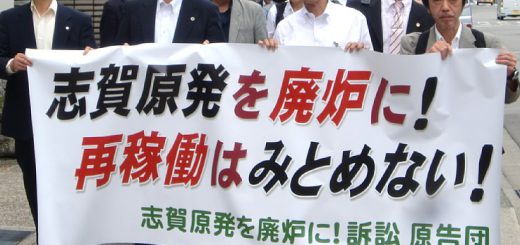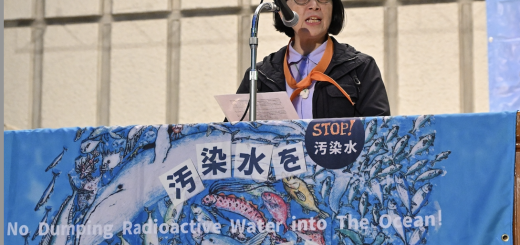News Watch 92 (Nov/Dec 2002) Nuke Info Tokyo No. 92
| Prefectural Governments of Niigata and Fukushima Completely Retract their Prior Consent to the Plu-Thermal Program
A New Plan to Separate NISA from Nuclear Promotion Administration The Fukushima Energy Policy Review Committee Publishes an Interim Report |
||
|
|
||
| Prefectural Governments of Niigata and Fukushima Completely Retract their Prior Consent to the Plu-Thermal ProgramIn response to the revelation of Tokyo Electric Power Co.’s series of nuclear reactor damage cover-ups and false reports, the prefectural governments of both Niigata and Fukushima, where the use of MOX fuel in thermal reactors (the so-called Plu-thermal program) had been planned, completely retracted their prior consent to the program.
In Niigata, as reported in NIT No. 91, the head of Kariwa village was holding “dialogue meetings” with villagers in an attempt to overturn the outcome of the plebiscite, which took place in May last year and in which 54% of the effective votes were against the program. On August 29, the last day of the “dialogue,” TEPCO’s dishonest acts were revealed. On September 6 Kashiwazaki City Council decided to retract their prior consent to the use of MOX fuel for Kashiwazaki-Kariwa 3. On September 11 Kariwa Village Council followed suit. On September 12 the governor of Niigata Prefecture, the Mayor of Kashiwazaki City and the head of Kariwa Village met and agreed to retract their prior consent, and each of them notified TEPCO in writing of the retraction of their consent. In Fukushima, on September 2, the council members of Okuma-machi, where Fukushima I-3 is located, unanimously decided to retract their prior consent. On September 8 the mayors of four towns where Fukushima I and II are located, agreed to freeze the Plu-thermal program. At the press conference held on September 19, the governor of the prefecture expressed his regret, saying that the prior consent was a mistake and that “his feeling of regret was stronger than that of Niigata.” On September 26 he officially announced “the complete retraction of the program” at the prefectural council meeting. The prefectural council on October 11 decided to submit a written statement to the national government requesting, “not to implement the Plu-thermal program in Fukushima prefecutre, as its precondition has lapsed.” |
||
|
|
||
| Even with the Unscheduled Suspension of Reactor Operations, There is Still a Plentiful Supply of PowerCoupled with the operation stoppage for inspection after the revelation of frauds and periodical inspections, all four of Chubu Electric Power Co.’s reactors and 9 of Tokyo Electric Power Co.’s 17 reactors had their operations suspended. Even in such a serious situation, there is still electricity to spare. Thus, some people question the necessity of relying on nuclear power. Due to excess capacity, in the last several years an increasing number of thermal power stations have been discontinued or had their operation suspended. The Agency of Natural Resources and Energy considers that if some of the suspended thermal power stations were to resume operation in the peak period of power demand in winter, “an adequate reserve rate of 8-10% could be secured.”
The fact that more than five reactors were forced to be suspended due to the fraud revelation, has shown us a new problem in terms of the instability of nuclear power as an energy supply source. With nuclear power plants, the situation might occur where all the other reactors in a plant had to be stopped due to an accident in one reactor; or all reactors of the same type may have to be stopped for inspection. Because many reactors may have to be stopped all at once, it has been pointed out that nuclear energy is unstable. Even with a small accident such as a short of a power line or changes in voltage and frequency caused by lightning, a reactor would instantly be stopped in order to protect the equipment. In this regard, too, nuclear power is unreliable. In addition to these problems, reactors have been suspended due to the fraud revelation. The instability of nuclear power as an energy source tells us that “it is safer for us not to depend on nuclear power.” |
||
|
|
||
| A New Plan to Separate NISA from Nuclear Promotion AdministrationThe Nuclear and Industrial Safety Agency (NISA), which is in charge of safety regulations for nuclear plants and other nuclear-related facilities, has been positioned as a special organization affiliated to the Agency of Natural Resources and Energy (ANRE), an extra-ministerial bureau of the Ministry of Economy, Trade and Industry (METI). ANRE is in charge of nuclear promotion administration. Before the government ministries and agencies were reorganized in January 2001, there were several sections within ANRE which were in charge of nuclear promotion and regulations. Some of those sections in charge of regulations were put into NISA as an “independent” organization. However, there was a criticism that, as seen from the above-mentioned position, NISA had little independence.
A new plan has suddenly appeared to separate NISA from METI and transfer it to the Cabinet Office. The strongest advocate of the plan is Morio Kimura, the governor of Aomori Prefecture. At the consultation meeting with the government about the nuclear fuel-cycle policy, held on October 10, the governor made a request for the independence of NISA, stating that it was necessary to recover confidence in nuclear safety administration. He further showed a hard stance, saying that if the government does not meet the prefecture’s expectation, it might refuse to accept that spent fuel be transported to the Rokkasho reprocessing plant, presently under construction, and that a “grave decision” might be made on the start of operation of the plant. The Nuclear Safety Commission (NSC) is set up in the Cabinet office, but Governor Kimura has shown a negative view on the integration of NISA and NSC. |
||
|
|
||
| The Fukushima Energy Policy Review Committee Publishes an Interim ReportOn September 19, the Fukushima Energy Policy Review Committee, an internal organization of the prefectural government, set up in May 2001 by the governor of Fukushima Prefecture (the chairperson is the governor), released “an interim report.” The committee was set up to facilitate the region’s autonomous development without being influenced by the way the state and utilities are moving through their energy policies like a bulldozer. It first held a “meeting to listen to the opinions of the prefectural residents,” and decided the themes of the committee, a wide range of which include: 1) an ideal approach for science, technology and human society in the 21st century, 2) energy policy, 3) policy for nuclear power and 4) regional development. The committee has met 22 times for review in accordance with these themes. Eleven of the meetings were held with scholars and specialists to exchange views. One meeting was with members of the Atomic Energy Commission.
The report questions the promoters’ rationale for nuclear power, such as “little release of carbon dioxide,” and “low costs,” and strongly criticizes the policy of reprocessing spent fuel to use plutonium, since this does not help save resources but increases excess plutonium. Based on these criticisms the report demands that the government “stop stitcking obstinately stick to a fixed policy,” “thoroughly implement free access to information and have people participate in policy decision making,” and “review the nuclear fuel cycle policy and ask the public about the future policy.” On October 7, Governor Eisaku Sato met with the chairpersons of the Atomic Energy Commission and the Nuclear Safety Commission. At the meeting the governor strongly asserted that the nuclear fuel cycle policy, including the MOX fuel plan, should be reviewed from the beginning. METI expressed reluctance at the separation of the agency from the METI, and at the future prospect of the plan is not certain. |
||


